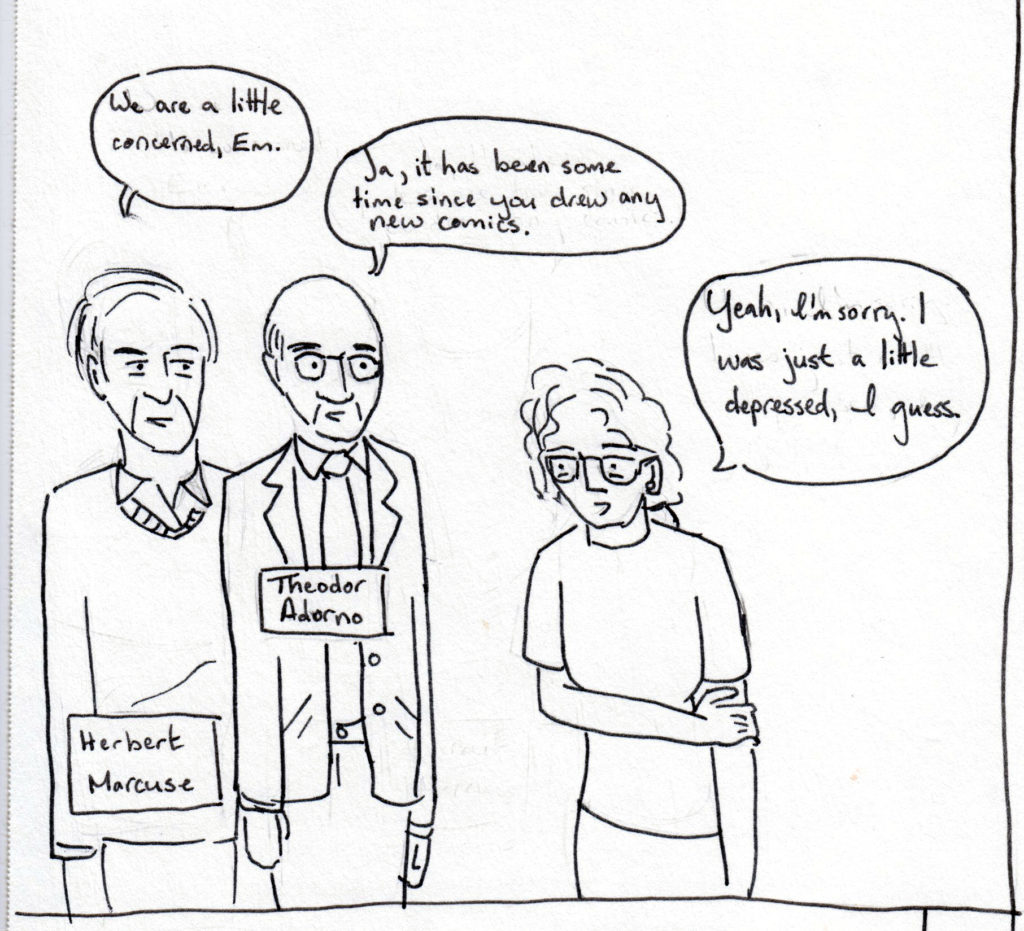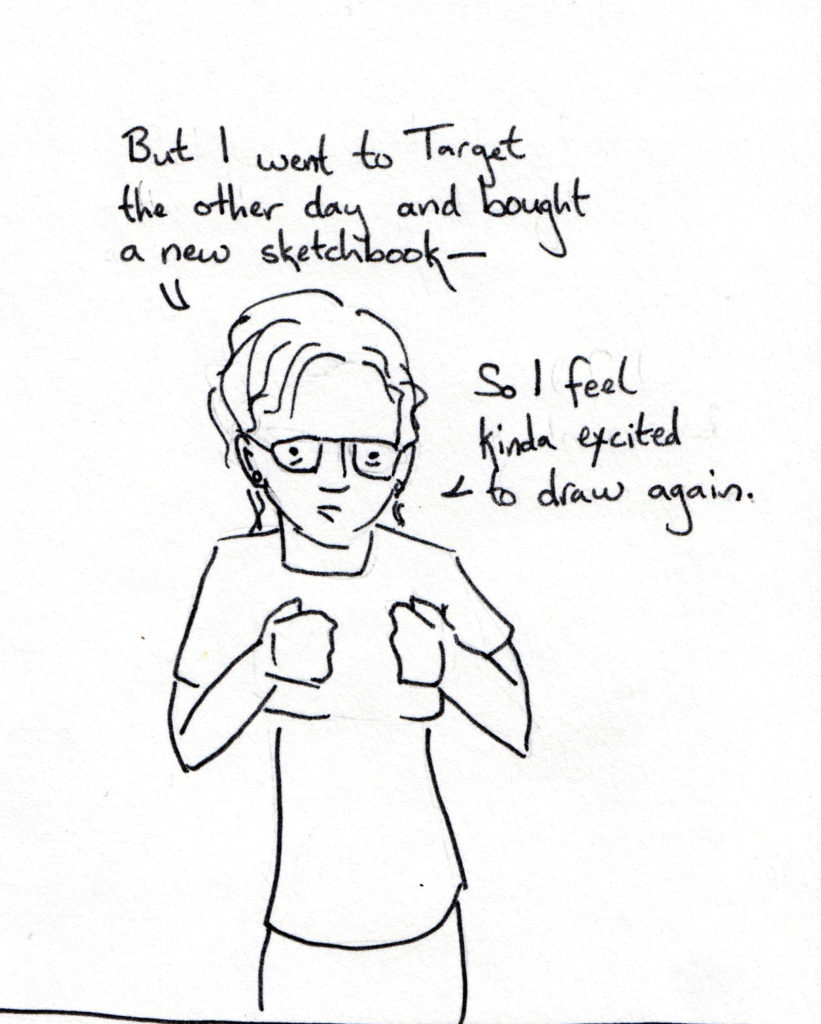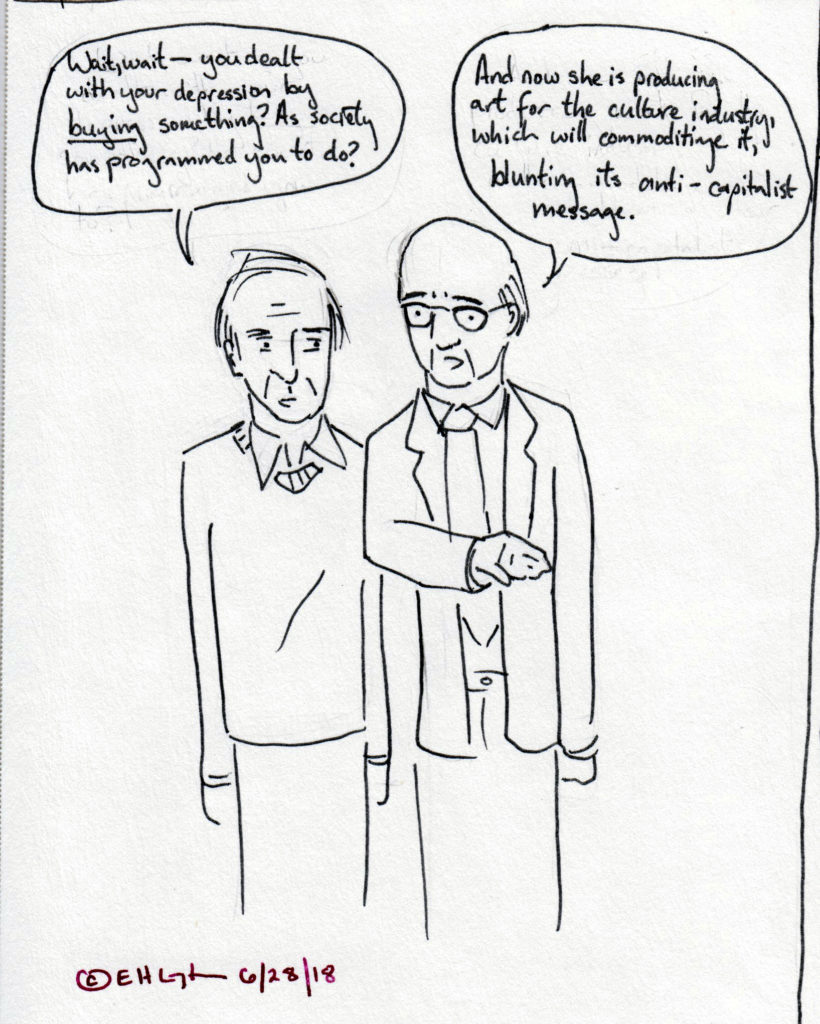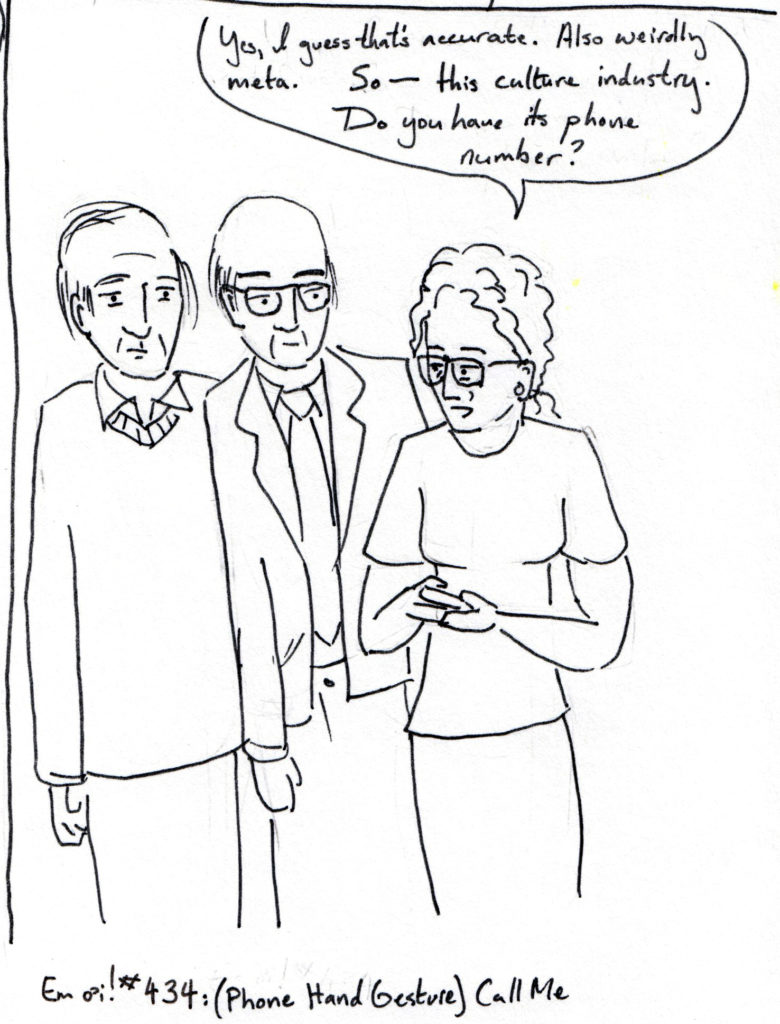Not too long ago, my brother Daniel recommended a podcast to me called Philosophize This! After briefly trying to argue with him that, basically, no podcaster guy could possibly be as good as my current research system of 1/ watching videos on YouTube, 2/ reading the Stanford Encyclopedia of Philosophy (and also Wikipedia), and 3/ reading one page of Foucault’s History of Human Sexuality per night, I gave up and became a fan. And that was how I met the Frankfurt School. And now I am reading The Dialectic of Enlightenment at a rate of one page per night. So, you know.
Okay, back up. Who were the Frankfurt School? They were a group of neo-Marxist thinkers from Frankfurt, Germany (natch) who started wondering in the mid-1920s why there hadn’t been a really good Marxist revolution and how they could potentially maybe fix up Marx’s theory to deal with that fact. In part because a bunch of them were Jewish, they moved their operations to New York during WWII, and discovered that we are terrible wrote a lot of rather damning things about American monopoly capitalism and the culture industry. They have been in the news a bit because there’s a booming industry in this country right now of people who explain to white men how they are really the ones being oppressed, and part of that narrative is about how Marxism/socialism are oppressive and bad and capitalism is awesome and don’t you miss those glory days when you, a white dude, could work really hard and be rewarded with money and chicks[1]. And if that kind of person hates the Frankfurt School, you know they have to be pretty good. Up until now, the member of their group I was most familiar with was Walter Benjamin. Here, I am looking at two other members–Theodor Adorno and Herbert Marcuse.[2]
I wanna talk about the culture industry for a moment.
Basically, capitalism tends to commodify whatever it touches, and in this case the thing it has commodified is (drum roll) ART. Which art? Whatever you have on hand–film and TV, so-called fine art (paintings or what have you), magazines, music, books, whatever. Essentially, with the advent of capitalism, the commercialization of art becomes really obvious, and art is suddenly being created to net its creators money. Thus the art that is created is art that is marketable, which means that it in some way reinforces cultural narratives (and thereby pacify the populace, preventing the formation of class consciousness and ultimately REVOLUTION). For example, shows like COPS, Rescue 911, NCIS and its ilk, and so on are all created to depict police officers as heroes.[3] I don’t believe that there has ever been an episode of COPS where one of the eponymous cops shot an unarmed 11-year-old boy. Could you imagine the public outcry if a story like that were produced? Instead, better to say that the officer involved in the shooting was either one bad egg amongst a lot of hard workers, or that it was an honest and reasonable mistake, which are somehow things people actually believe and say out loud without thinking that they are in some way bad people for thinking/saying those things when a kid gets shot.[4]
Another way this can work is by taking something that is revolutionary (the podcast used the example of NWA’s “Fuck the Police”) and amplifying it in popularity to the point where all meaning is drowned out by the commercialism (see also my forthcoming “Frankfurt School Powerlifting Team / Reps for Marx” t-shirts). Finally, of course, advertising has become integrated into media products, and it exists to essentially tell you that you have a problem and their product is the solution.[5]
Okay, so right now you’re probably saying two things:
- Em, what did he think art was before capitalism though?
- This idea of a “culture industry” is kinda neat, but who are these people? Em, you’ve been a part (albeit a very small one) of the culture industry for a while. While it’s pretty clear that any given editor or producer would probably sell all of their loved ones to the ravenous bug-blatter beast of Traal for a shot at a major deal, no one of them in particular is sitting around saying, “Okay, uh, we’re gonna need three rom-coms to reinforce all the heterosexual-monogamy norms, um, maybe a couple horror flicks where the non-white people die first to remind everyone that it’s best to be white, and then…oh, the oil and gas industry wants a sci-fi dystopia this year that reminds people that technological advancement is dangerous and we should stick with what we have.”[6]
And yeah, I think these are legitimate critiques of the idea. Per #1, I have only taken one art history course, but it’s pretty clear that most (all?) capital-A ART (the type you see in a museum like the Met–anything from like the Renaissance on) was created for what we would call capitalistic purposes–much of it was commissioned portraits of family members for wealthy merchants, or religious scenes commissioned for private contemplation. And artists painted these not because they had a particular yen to do one more gold-leaf painting of Jesus, but because they needed to eat and feed their families and buy paints and canvas. And yes, I know there’s some overlap between the late Renaissance and the beginning of capitalism. But also we could say that before the Renaissance, a lot of art was created at the behest of the church, which also was a way for artists to earn a living.
To point two, I don’t know (yet; I’m still reading) how Adorno would answer this. Foucault would suggest that this is a power system–it’s simultaneously no one pulling the strings and everyone doing it, because that’s how capitalism works on people.
When I first heard the episode that talked about the Frankfurt School, I was struck by this critique of modern life–and also I felt quite guilty, because even though I am generally someone who doesn’t shop a lot, doesn’t buy things for pleasure or whatever, I had been feeling depressed and I had tried to snap myself out of it by buying myself a new pen and a truly startling number of ink samples. And I was still feeling depressed and still kind of telling myself I just needed to think of a good present for myself.
Anyway, if this sounds a lot like some of the other theorists I’ve talked about–Chomsky’s media theory, many of the ways Zizek critiques modern capitalism, even old man Marx himself, well, it seems I have a “type” when it comes to philosophers. And also these philosophers, when taken in a more chronological order rather than piecemeal, start to seem as though they’re building on and responding to each others’ work. I quite enjoyed my little trip through 20th/21st century philosophy (I started with Schopenhauer and worked my way through to Derrrida, and now I’m messing around with Hegel).
I have now spent more time working on this than I have on the latest novella for almost three days. I guess I know too many Marxists who are likely to correct me about the stuff I’ve got wrong here (it’s actually more complex and nuanced theory, so go and explore it). I’m calling this one done at any rate. Let’s file it under HM467 L86 2018, for Sociology–History of sociology. History of sociological theory–Schools of sociology. Schools of thought–Special schools–Frankfurt school.
—
Notes:
[1] Ways in which men are arguably oppressed: society frowns on them when they want to do something other than be a wage-earner, like if they want to be a stay-at-home dad. Straight men’s sexuality is arguably pretty rigid–a lot of people still see women as able to experiment, but men aren’t given that permission. Men are looked down on if they express emotions other than happiness/love and anger (only white men can express anger publicly). During divorces, women are typically given primary custody of their children unless they are provably super incompetent (e.g., addicted to substances) or they agree to give their exes more access. Ways in which men are not oppressed: women having jobs; women being able to pick their own romantic partners; jobs being given out without regard for race or gender (and often in ways that encourage those who are non-white/non-male to apply for them); everyone having access to health insurance. What will fix men’s oppression: feminism, which argues that women and men are equal and should be treated as such by society. What won’t fix these issues: saying that “if women were required to sleep with them, men wouldn’t shoot up women/drive trucks into crowds for being forced to be celibate.” (Editor’s note: We’ve removed a lengthy rant about a writer who will not be named here; the content of the rant can pretty much be derived from first principles. Ms. LM is resting comfortably.)
[2] Technically, The Dialectic of Enlightenment is by Adorno and Max Horkheimer. But the way I draw people, they look way too similar to each other, so I decided to use Marcuse. Also, Marcuse was the one writing about the ways in which capitalism is oppressive, so some of the ideas here are his.
[3] In fact, I believe some groups like the FBI and CIA offer incentives to films that want to showcase agents in them in some way, along with consulting on procedure and other nuances. Of course, these films have to depict the agents in a positive light.
[4] Right now, of course, you are thinking to yourself–wait, what about fan fiction? Is that a reappropriation of cultural touchstones by the people now devoid of folkloric heroes, or simply the mealy mouthed re-recitation of the same tropes endemic in the original media? I don’t know! It’s very exciting, isn’t it.
[5] One of the weirdest things that I’ve noticed lately is not just product placement in films, like ET eating Reeses Pieces, but characters from films appearing in commercials for the products that are sponsoring the film. But maybe this is pretty normal at this point and I just never noticed.
[6] Even if the rom-coms don’t reinforce the cultural narratives about marriage etc., they still act as escapism and prevent their viewers from focusing on the true issue–REVOLUTION. Oh, and also that the Enlightenment was bad. So. You know.





All art may be commoditized, but this is PRICELESS!!
I read “Dialactic of Enlightenment” in 1974. One of my professors at the University of Colorado co-translated Adorno’s “Philosophy of Modern Music” – which I got to read from a publisher’s proof (so, my German literature professor got the ball rolling for me, so to speak). We only had things like books and libraries in 1974 … nothing like blogs … so, it’s interesting for me to read what you’ve written.
When I first read “Dialactic of Enlightenment” is when I started feeling really alone. All these years later, and I feel even more alone. When I say “alone” – this is in terms of having anyone around me to share the insights I gained from reading the “Dialactic of Enlightenment”. Yeah, sure … I’m an artist too (so, being alone has always gone with the territory for me). But I’m talking about a kind of aloneness which is pretty close to nonexistence … having never been born. It’s what happens in our world when you learn something which contradicts totally what motivates the person next to you. You are no longer seen or heard; you simply cease to exist for others.
Your “folksy” style of writing about a book which changed my life, I suppose, is a way of minimizing the risk of the nonexistence I refer to (or, something of this nature). I hope you have some luck with it. I’m getting close to the end of my life; and while I’ve had some luck with a few things others have not have (for example, I no longer live in America since 1990), the feeling of nonexistence only grows (… but maybe this was the “goal” all along). Best Wishes from a small town in Germany.
Hi David,
I’m not sure about my “folksy” style–I’m sort of a quintessential outsider artist, so there’s that, and I value simplicity in explanations of complicated subjects. As I’m sure you’ve noticed, people are often afraid to take up topics like those in the Dialectic of Enlightenment, but explaining the ideas in more straightforward terms can often spark discussion. In a sense, it’s about reaching across the nonexistence gap you refer to.
I don’t know that the D of E made me feel like I’d ceased to exist, exactly, but it raised a lot of hard questions about the essentially exploitable nature of art that as an artist I felt like I needed to engage with, questions that are also directly at odds with my inherent drive to do something BIG and be NOTICED for my AMAZING ART (or something). And there’s not really a good way around the culture industry problem, really–either your art gets co-opted by the dominant cultural paradigm, or ___? You don’t make art? That doesn’t seem like a good life.
Anyway, sorry to hear you haven’t found a way of minimizing the nonexistence. I had always assumed that Europeans valued/spoke more about philosophy than Americans do (for example the French study philosophy in high school), but perhaps not.
I take back my use of “folksy.” I honestly don’t know what the right term is right now. But I didn’t intend it in any demeaning or critical way (and if there had been a way of correcting my text, I would definitely have removed it … it was only the first term which came to mind).
Otherwise, I think you fundamentally misunderstood most of what I wrote. I’m not blaming you for this, however. In my (lifetime) experience, I know that I can be difficult for people to understand (even when I think I’m being perfectly clear). It took me over 50 years of my life to understand – in a specific sense – why this is so (but I finally did it). There is also a large quantity of “facts” which you simply don’t know about me (but, of course, this is also not your fault).
It’s great to be able to speak and write simply about complex things. The only problem (in my experience, anyway) is that sometimes it is not possible without distorting one’s subject. Sometimes it’s better in the long run to admit that many things are complex and difficult – and then, try to raise ourselves to level of dealing with complexity and difficulty rather than reducing the topic to fit into our limitations (but this is only my own opinion). Of course, dealing with complexity by accepting it almost never works in a “general public” sense. People are not equipped for it; they have no use or time for it, etc. (it’s just the way things are).
I don’t want to say anything more of a personal nature about myself in a public discussion. It’s just not my thing. However, you have my mail address – and I’d be happy to try to explain more about the person it took me 50 years to discover. I have a blog too: https://insignificantattempt.blogspot.com/ … but it’s not a “real blog” like yours … it’s only a place I sometimes throw things which I don’t want to disappear (mostly, it’s a lot of music but there are other things as well … scans of texts, etc. … a whole lot of things most people haven’t the slightest interest in). Here are 100 paintings https://insignificantattempt.blogspot.com/2018/04/100-paintings-mixed-materials-with.html … and here are some drawings from the 1970’s https://insignificantattempt.blogspot.com/2016/03/letters-from-nowhere-71-drawings-2016-d.html
Yeaaaaahh… I don’t mean that you should be able to explain something in words of one syllable, but there’s a big difference between using well-defined terms to speak clearly about complex topics and using obfuscating language to cover up the fact that your ideas are unclear, simple, or not well thought out (philosophers Derrida and Homi Bhaba have both been accused of this). I try to practice the former. I do agree that contemporary public discourse is not really ready for dealing with the gray areas surrounding things. It is a source of frustration for me.
Anyway, thank you for your comments. Glad you enjoyed the comic.
You’re welcome for the comments, but maybe you missed my last one:
Since I have a lot of other things on my mind in the moment, here is something else I forgot.
https://www.quora.com/How-has-art-opened-your-heart-or-the-hearts-of-others/answer/David-A-Powell-1
It is the COMPLETE version of the piece of writing I sent the link for above. It “reveals” (for example) what took me 50 years to learn about myself.
By the way, my thinking about “art and society” continues to evolve and is not dependent on the insights contained in the writings of the Frankfurt School (and I still recommend the books of Byung-Chul Han because they are simply a lot more current than something written in 1944 … in spite of the fact that the Frankfurt School possesses an undisputed cornerstone status).
The main thing you completely misunderstood is this: the Dialectic of Enlightenment (or reading it) was NOT responsible for the feeling of nonexistence I mentioned. What makes me feel as though I don’t exist is the way I’m TREATED by the society / culture / world dealt with in this book – which is an ongoing, continually developing phenomenon; the way I’m treated by my “fellow artists” in addition to “average citizens” as well as the whole evolving system itself (but especially how I’m treated by my “fellow artists” who, in your words, have an “inherent drive to do something BIG and be NOTICED” … plus a lot more such as making piles and piles of cash). In other words, what I’m personally up against is not simply what you call the “culture industry problem”.
You also seem to understand little about Europe. What good does it do me when the French study philosophy in high school? The French belong to the same neoliberal capitalist system as the rest of the world. So, the fact that I don’t live in France is not just irrelevant – it has nothing to do with anything I’m up against. When Byung-Chul Han stated last year (it was during a talk he gave in Barcelona, to be exact): “In Orwell’s ‘1984’ society knew it was being dominated. Today we are not even aware of the domination.” … THIS is what it means and nothing less … that is, I’m up against a world which doesn’t even know it’s being dominated (and probably would care less even it it DID know) … and this can make one feel as though one doesn’t exist … because I AM aware of the domination for a very long time now.
I forgot. I also have a You Tube channel (I put it together recently when I needed something to do … otherwise, I’m doing other things in the moment): https://www.youtube.com/channel/UC3x_FPI-qYoU3pL1679COGQ/featured
… and if you click on “see more” for the info for this upload, one gets a very shortened version of something I wrote:
https://www.youtube.com/watch?v=J3Pzh_IEgrU&t=293s
(there are also other mini-essays here and there among the uploads)
Since I have a lot of other things on my mind in the moment, here is something else I forgot. https://www.quora.com/How-has-art-opened-your-heart-or-the-hearts-ofothers/
answer/David-A-Powell-1
It is the COMPLETE version of the piece of writing I sent the link for above. It “reveals” (for example) what took me 50 years to learn about myself.
By the way, my thinking about “art and society” continues to evolve and is not dependent on the insights contained in the writings of the Frankfurt School (and I still recommend the books of Byung-Chul Han because they are simply a lot more current than something written in 1944 … in spite of the fact that the Frankfurt School possesses an undisputed cornerstone status).
The main thing you completely misunderstood is this: the Dialectic of Enlightenment (or reading it) was NOT responsible for the feeling of nonexistence I mentioned. What makes me feel as though I don’t exist is the way I’m TREATED by the society / culture / world dealt with in this book – which is an ongoing, continually developing phenomenon; the way I’m treated by my “fellow artists” in addition to “average citizens” as well as the whole evolving system itself (but especially how I’m treated by my “fellow artists” who, in your words, have an “inherent drive to do something BIG and be NOTICED” … plus a lot more such as making piles and piles of cash). In other words, what I’m personally up against is not simply what you call the “culture industry problem”.
You also seem to understand little about Europe. What good does it do me when the French study philosophy in high school? The French belong to the same neoliberal capitalist system as the rest of the world. So, the fact that I don’t live in France is not just irrelevant – it has nothing to do with anything I’m up against. When Byung-Chul Han stated last year (it was during a talk he gave in Barcelona, to be exact): “In Orwell’s ‘1984’ society knew it was being dominated. Today we are not even aware of the domination.” … THIS is what it means and nothing less … that is, I’m up against a world which doesn’t even know it’s being dominated (and probably would care less even it it DID know) … and this can make one feel as though one doesn’t exist … because I AM aware of the domination for a very long time now.
PS – Maybe your “folksy style” is just the way you write; just who you are (sorry, I didn’t think about it very much). At any rate, I still wish you luck.
Correction: “Dialectic of Enlightenment” (you know, the eyes go along with the social life).
… and then one has the philosopher Byung-Chul Han who has written about the disappearance of the “other” among many other themes related to those dealt with by the Frankfurt School – only considerably updated for our thoroughly digitalized neoliberal world (“The Emptiness of the One-Dimensional Self: Byung-Chul Han’s Expulsion of the Other”): https://dergipark.org.tr/downloa…
(Han came to Germany from South Korea around the time I came here from America). If you don’t know Han’s highly readable books, perhaps he should be next on your list.
“In Orwell’s ‘1984’ society knew it was being dominated. Today we are not even aware of the domination.” – Byung-Chul Han (2018)
Here’s the link again in a working version:
https://www.quora.com/How-has-art-opened-your-heart-or-the-hearts-of-others/answer/David-A-Powell-1